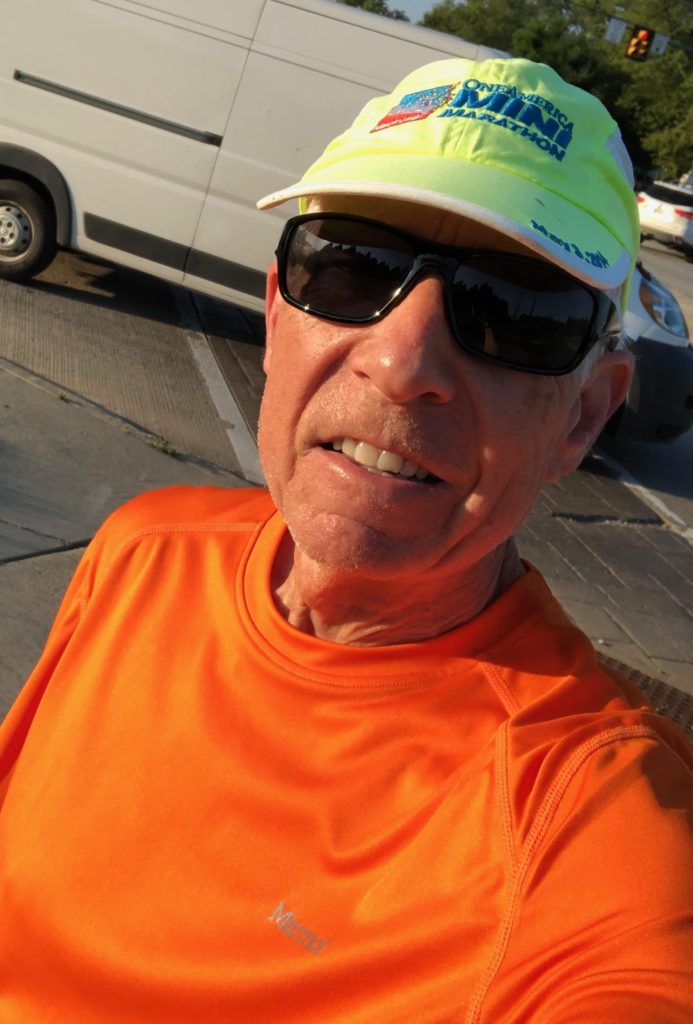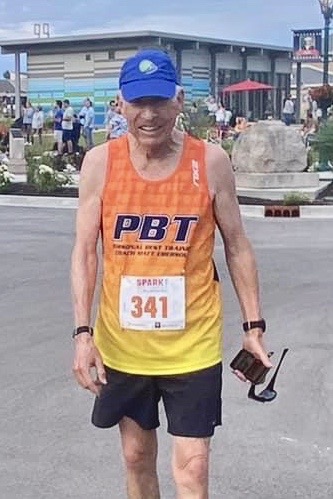
Parkie
Parkie is an ill-mannered scoundrel. He comes uninvited to your party. He hangs around and doesn’t speak—until one day when you are not expecting it. Then he won’t shut up. You go to your doctor and get some pills. Maybe you feel a little better, but you get angry and decide to fight back. You build your strength and develop an attitude. You look him in the eye and he may retreat a bit.
You get stronger and feel better. He never goes away, loitering, waiting for a weak moment to launch a new attack. You have good days and not-so-good days. You get older and question how you are doing. It is so subjective that you begin to question your condition. Well-meaning family and friends say you look great/awful, your symptoms are better/worse, you should work harder/rest more. You may feel doubt, discouragement, or even depression. Your “State of PD” is difficult to quantify objectively, if at all. How am I doing? Can anyone tell me? Please?
Running
 I have found my litmus test in running. I started competitive running in 2010, 6 years into diagnosis. I have eleven years of statistics. The clock is brutally honest. It knows no friends or enemies, but you can make it your friend if you can accept the truth. The ego withers, but you come to know yourself.
I have found my litmus test in running. I started competitive running in 2010, 6 years into diagnosis. I have eleven years of statistics. The clock is brutally honest. It knows no friends or enemies, but you can make it your friend if you can accept the truth. The ego withers, but you come to know yourself.
I had the rare joy of improving my running from age 64-70. The year I turned 70 I ran PR’s at one mile, 5K, 5-mile, quarter marathon, half marathon, and marathon. Since then, time and non-Parkinson’s related physical issues have taken a toll. I have looked at age-graded results to take getting older out of the variables. One-third of my top twenty-five age-graded results came in the last year. Some years are racier than others. I usually don’t race injured.
Running does not directly measure the mental effects of PD, but I am confident that exercise brings many benefits to the brain as well. I know I am not as strong as I was ten years ago. But the running results would imply that relative to my age I have not lost physical potential to Parkie!
The number of runners shrinks dramatically year by year after age 60. I can understand why. I don’t understand why I was blessed to run at my age, but one way to honor the blessing is to use it to share your joy. Runners or not, people with Parkinson’s can defer some of the consequences of the condition through a commitment to physical training.
Personal Bests
All the benefits I have enjoyed through running would never have happened without the support and encouragement from my family, my coaches at Rock Steady Boxing and PBT who showed me I could do it, the support and encouragement from PBT, Fishers Running Club, Rock Steady fellow boxers, a medical team that understood runners, and the generous support of my church family and old and new friends
Personal Best’s come in many forms. The most important personal best is not the one you enjoyed when you were younger, it is the one you seek today.
__________
Steve Gilbert was diagnosed with Parkinson’s disease in 2004. In 2007, he became one of the early Parkies to discover the empowerment of fitness developed through the boxing-inspired training at Rock Steady Boxing. As a result, he began running competitively in 2010 and has consistently won his age group since turning 70. In addition to Parkinson’s, he is surviving prostate cancer and has recovered from hernia mesh migration repair. He often says, “God chose to bless me with the opportunity to run. I made the commitment to put in the work.”
